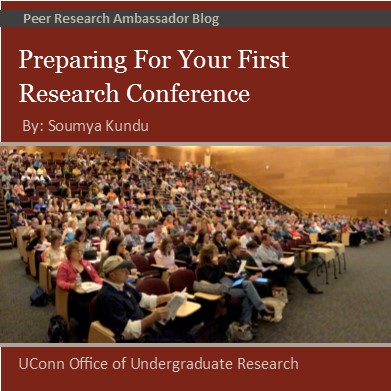By: Soumya Kundu, OUR Peer Research Ambassador
Your first research conference will be one of the most exciting experiences of your research career. After spending months working in your lab, this is going to be your first opportunity to meet other researchers in your field outside of your university, catch a glimpse of some of the work being done by peers at other institutions, and maybe even present your own work! However, as with most new experiences, there is always a degree of anxiety that comes with the uncertainty of not knowing what to expect at your first conference. Here, I will offer a few simple pieces of advice that can help you prepare to make the most of this valuable opportunity.
Look through the program booklet:
The conference organizers will most likely upload a program booklet to their website at least a few days prior to the start of the conference. This document will usually contain a schedule for the entire event and information about the keynote speakers, along with numerous other details that can help you plan your experience ahead of time. If you are preparing for an oral or poster presentation at your conference, this will also be a great resource for finding out where and when you are scheduled to present.
Scout out the interesting talks:
Conferences can vary greatly in size. For smaller ones, there might only be a single track, which means that there will be only one session at a time where papers are presented. Naturally, this is easy to navigate, as you never have to choose between two equally interesting talks that are scheduled at the same time. However, for larger conferences with multiple tracks, planning ahead will serve you well. Usually, each session at a conference will have a topic or a theme, so an easy way to decide which session to attend among competing ones is to pick the one with the topic that you find most interesting. Yet, even those sessions which might not appear interesting at first might have a paper scheduled to be presented there that is particularly intriguing or pertains to the research that you are doing. In order to make sure that you catch all of those talks that you might be interested in, you should spend some time making a note of them all and build your personal conference schedule.
Find out who will be there:
A conference is a great place to meet other students like yourself who are engaged in research in your field. In addition, there will also be a good number of senior researchers, including university professors, who will be present, making it a great opportunity to talk to faculty members from other schools about their research. If you are interested in pursuing a Ph.D., perhaps you will find their work intriguing and decide to apply to their school’s graduate program in hopes of working with them. In order to prepare yourself to ask meaningful questions during a conversation that you might strike up with a professor, it is always a good idea to briefly explore in advance some of the interesting research areas that the professors who will be present at the conference are working in. Not all of the professors who have authored papers being presented at the conference will be in attendance themselves, as most presentations are usually done by the graduate students. However, if a professor is scheduled to chair a session at the conference, then there is a good chance that they will actually be present. From there, you can quickly look up what research areas those session chairs are working in and make a note of whose work seem most appealing to you so that you can approach them at the conference.
Explore the workshops that are offered:
Some conferences offer a variety of workshops for their attendees. These workshops might be about strictly academic topics such as ongoing research in a certain field, resulting in an experience that will be very similar to the regular conference sessions. On the other hand, there might be workshops on other aspects of the research life, such as applying for grants or fellowships and choosing careers in your research field, and those might feature panels of researchers who can answer questions you might have. Exploring these offerings ahead of time and planning your conference schedule with them in mind can greatly enhance your experience.
Pack what you’ll need:
Perhaps the most challenging task that you will undertake before attending the conference is actually packing for it. Other than your usual travel necessities, you will need to decide what kind of clothes you should bring. If you need help deciding what you should be wearing at the conference, Peer Research Ambassador Kavita Sinha’s post on this topic is a great place to start. Also, make sure you find out the attractions that will be located near the venue for your conference. While the conference might take up most of your time during the day, you will still have plenty of opportunities to explore the surrounding area. If there happens to be a really nice trail that you would like to hike or a beach that you would like to visit not far from your hotel, make sure you pack accordingly.
Soumya Kundu is a senior majoring in Computer Science and Engineering, and minoring in Mathematics. Click here to learn more about Soumya.